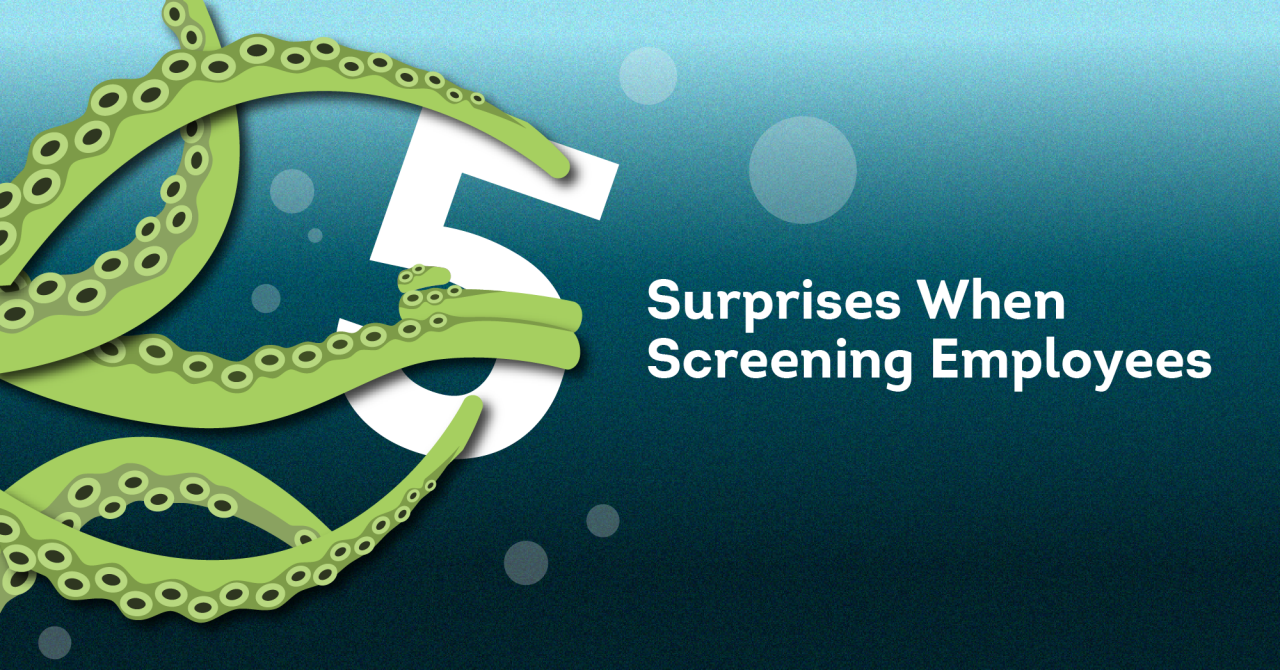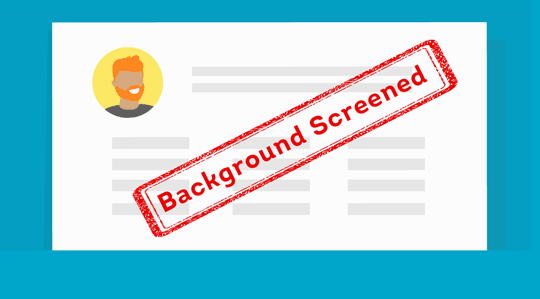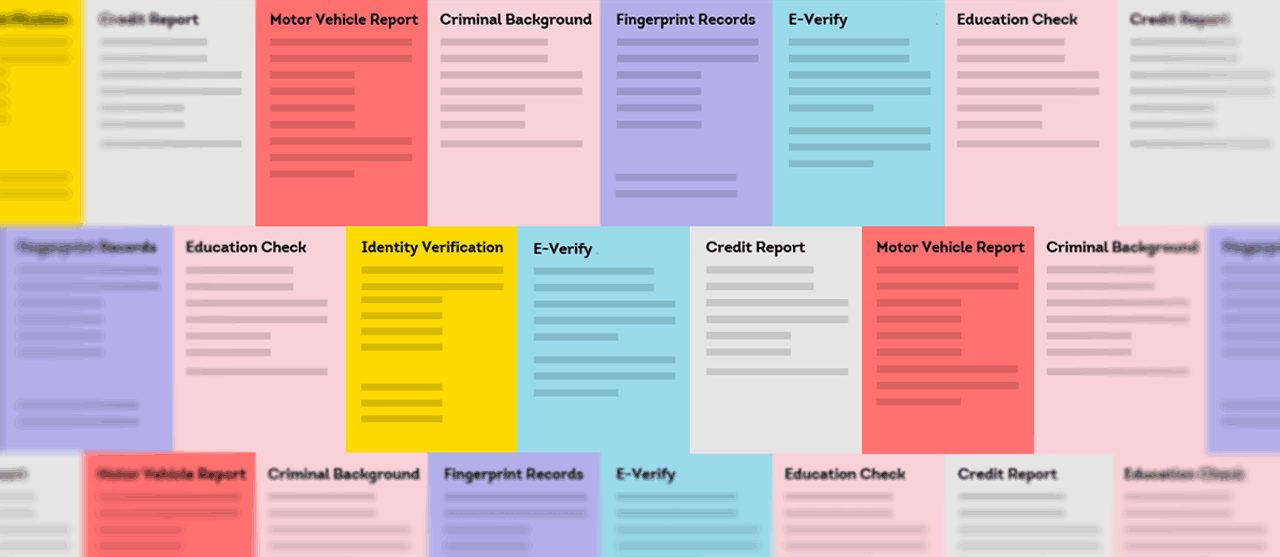Lots of small business owners conduct employee screening. However, many are surprised to discover the following facts about background checks for job applicants: one-in-three Americans have a criminal record, you can be sued for negligent hiring if your screening process isn’t good enough, almost half of job applicants lie on their resumes, DIY background checks can bankrupt your business if you’re not careful, and pre-employment screening can be ultra-fast and affordable.
Table of Contents:
Remember that this material is intended to provide you with helpful information and is not to be relied upon to make decisions, nor is this material intended to be or construed as legal advice. You are encouraged to consult your legal counsel for advice on your specific business operations and responsibilities under applicable law. Trademarks used in this material are the property of their respective owners and no affiliation or endorsement is implied.
On your birthday, surprises are fun. During employee background checks, not so much. According to the Society for Human Resources Management (SHRM), 87% of companies conduct pre-employment screening. However, even though the majority do some kind of vetting, there are still many employment screening details most employers don’t know about––details that could ruin your small business if you’re not careful.
Insufficient, DIY, or disorganized screening can easily come back to haunt you. Employee turnover and rehiring can cost tens of thousands of dollars. Hiring lawsuits can cost millions more. Even just a poor employee fit can threaten your organization’s safety, productivity, bottom line, and morale. Given the extreme risk of hiring the wrong person, it’s essential to not only screen employees, but screen them the right way through a service like ShareAble for Hires®.
No matter what kind of screening you conduct, knowing more about the hidden pitfalls can help protect you, your staff members, and your business. The following article highlights some surprising trends you might not know about employee screening and what you can do about them in your small business.
A lawsuit like that could easily bottom out insurance limits and potentially bankrupt many small businesses. That’s why it’s absolutely essential to conduct thorough pre-employment screening with a reputable company like ShareAble for Hires® to reduce the risks of negligent hiring lawsuits.
The following article covers the details of negligent hiring, provides examples of when employers might be found liable, and highlights practical, easy-to-implement steps that can help you reduce your risk of getting slapped with a negligent hiring lawsuit.
1. One in three Americans have a criminal record
Rap sheets may be more common than you think. According to CNBC, nearly 80 million American adults have some kind of criminal record––that’s about 33% of the population! And research from the University of Georgia further adds that around 8% of the total population has felony convictions.
First, it’s important to note that every situation is different. Not all crimes and convictions––or even felonies––mean trouble for your business. It’s relatively common for people to have records including misdemeanors like traffic violations. Plus, people can change.
Even so, it’s always better to know about someone’s criminal past before making any hiring decisions. After all, if someone has a history of frequent and violent assaults, you’d probably want to know about it before putting them on the front lines with customers.
As the business owner, it’s your job to keep your employees, customers, and livelihood safe. Help uncover important information by getting a background check through a reputable provider.
ShareAble for Hires hunts through nearly 400 million criminal records and dozens of law enforcement agencies looking for matches to your job applicant, including:
- Felony and misdemeanor records
- National Sex Offender Registry
- FBI’s Most Wanted list
- Department of Homeland Security records
- Federal Trade Commission crimes
- And more
Knowing what you’re dealing with ahead of time can help you make decisions that could safeguard your business.
2. You can be sued if your screening is insufficient—and you’re likely to lose
If you leave a cup of gasoline next to an open flame, you’re going to get blamed when a fire breaks out. Why? You should’ve known better. Similarly if you don’t take reasonable, thorough actions to determine if your potential new hire is dangerous, you could be responsible for any injuries or damages they cause while on the job.
According to Shouse Law Group, negligent hiring lawsuits occur when an employee causes harm to someone else and their “employer ‘knew or should have known’ of the employee’s risk to cause harm prior to staffing the harmful worker.”
What’s more, if you do get sued for negligent hiring, the odds are against you. According to a white paper from insurance group Zurich, employers lose negligent hiring cases about 75% of the time, with an average settlement of 1 million. Could your small business take that kind of financial hit? Probably not.
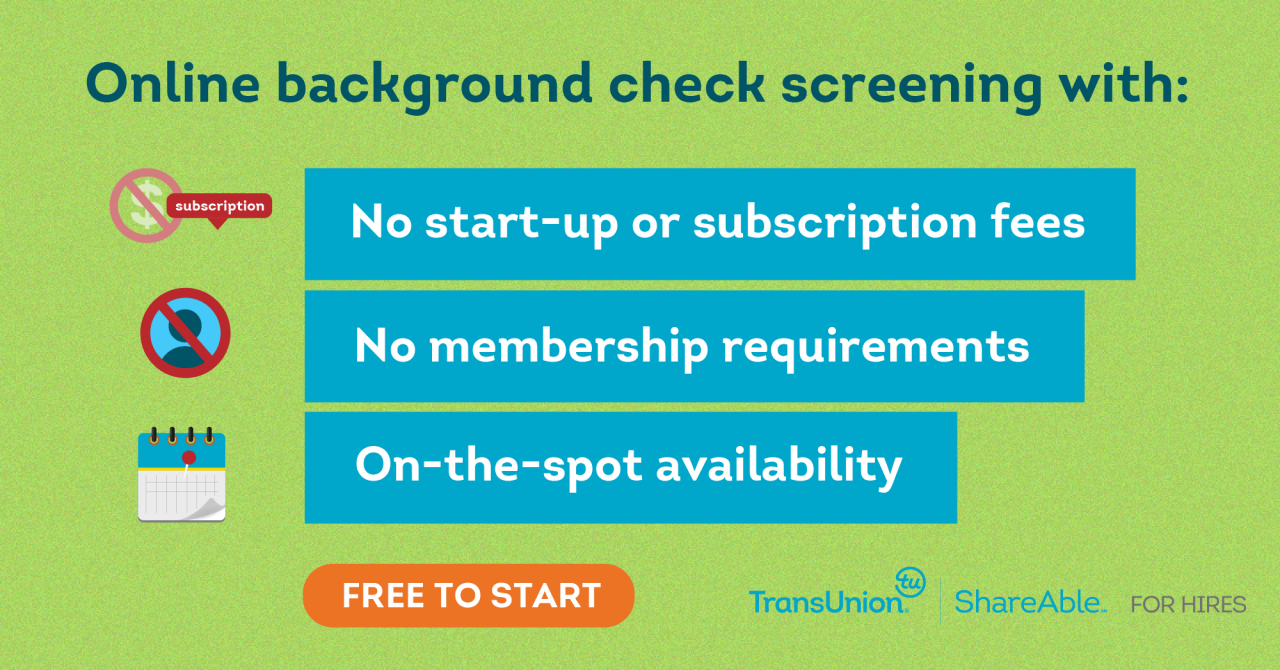
One of the best ways to help avoid negligent hiring lawsuits is to conduct thorough, detailed screening with a reputable provider like ShareAble for Hires. In addition to a criminal records check mentioned in the section above, it’s imperative to help protect yourself with other screening.
Identity verification
Confirm your applicant is who they say they are and not an imposter or fraudster. Identity checks compare your applicant’s self-reported personal information like SSN, birthday, and address against official records to see if they match. They also scour federal databases for potential fraud alerts, helping to give you more confidence.
Credit check
If your new employee will handle cash or sensitive information such as personal customer data or proprietary company details, it’s especially important to conduct a credit check. But why check a job applicant’s credit, specifically? Learning more about someone’s financial track record can help you better assess their responsibility with money, trustworthiness, and potential susceptibility to fraud––all which can reduce your risk.
3. Nearly 40% of job seekers admit to lying on their resume
Is your gut instinct really as good as you think? Maybe not. According to a survey from ResumeLab, 36% of respondents openly admitted to lying on a resume at some point in their career. The same survey showed the most common lies (27%) were about experience.
Do you want someone with less experience than they claim let loose in your small business? How about someone who is willing to deceive others to get a leg up in the application process? One important piece of screening is filtering out people who don’t quite live up to the image they’ve cultivated on paper.
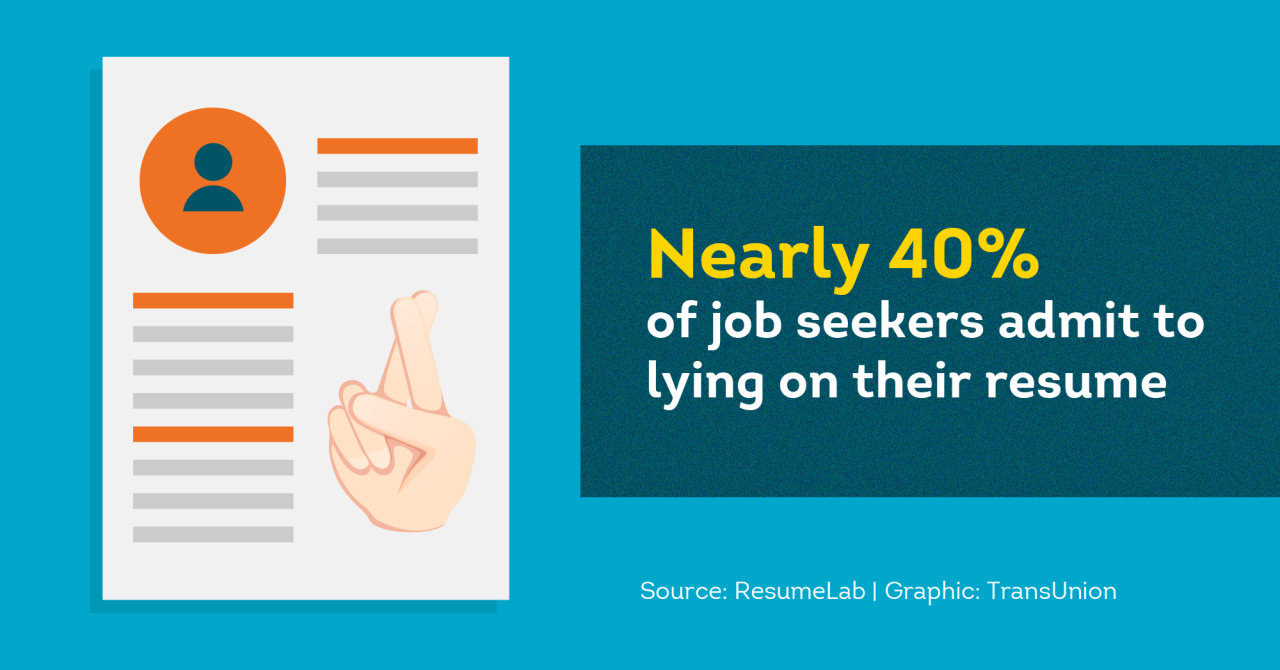
Proper, standardized pre-employment screening can help weed out candidates that aren’t as experienced or sparkling clean as they claim. In addition to running background reports, here are a few tips to help catch fraudsters in the act:
- Know how to spot resume fraud when reviewing candidates
- Make applicants easier to compare with standardized scorecards and interview questions
- Run educational verification to help confirm fancy degrees and certifications listed on a resume are accurate
- Ask smart employer reference check questions that zero-in on candidate’s real skills and challenges
Given that so many job applicants misrepresent themselves, trusting only your gut instinct isn’t enough. Help reveal the real story with high quality screening.
4. DIY screening can result in massive fines that could shutter your small business
Trying to conduct a DIY screening is one of the most dangerous gaps in small business background checks. Why? Because it opens you up to a litany of lawsuits and unnecessary risk. Here are some of the most common reasons small business owners get themselves into trouble:
- Accessing protected data without permission or training. Some information gleaned on background checks is protected by federal laws like the Fair Credit Reporting Act. Accessing data like consumer credit information without permission could lead to massive fines or worse.
If you aren’t certain you have permission to see a job applicant’s protected data, don’t follow procedures to legally obtain it, or even improperly manage, store, or dispose of someone’s personal details, you could get into legal trouble.
- Snooping on social media. According to a CareerBuilder survey, 70% of employers admit to checking out a job applicant’s social media before making a hiring decision, with 1 in 10 deciding not to hire based on what they saw.
While scoping out socials sounds like a good way of discovering potential red flags, it could land you in hot water instead. Social media can reveal sensitive information about job candidate marital and family status, religion, sexual orientation, or other protected class status, which could easily lead to hiring discrimination lawsuits.
- Relying on inaccurate or incomplete information. The internet is ripe with sketchy, unofficial “free” background check and personal record report providers. Often these are notoriously inaccurate. Unsuspecting small business owners conducting a DIY search may be attracted by the price tag. The consequences could cost them much more than the price of professional pre-employment screening.
These reports often have false information, outdated or inaccurate data, or even mismatches between people with a similar name. All of this means you have bad information, which could lead to uninformed hiring decisions.
Given the potential risks (and the availability of easy, affordable solutions) there’s no reason to run your own background check. Instead, always use a FCRA-compliant, reputable screening service like ShareAble for HIres.
5. Employee screening can be fast and affordable
Many people resort to conducting their own DIY background checks. This is because they believe it is going to be faster or cheaper than using a professional service. In reality, that’s just not true.
When hiring, time is of the essence. You need to know how long employee background checks take. Traditional background checks can take weeks––or even months––to complete, while requiring lengthy application procedures, monthly minimums, subscriptions, hidden fees, and approvals. However, it’s not like the old days anymore. Vetting your new employees doesn’t have to be slow, cumbersome, or even expensive.
ShareAble for Hires provides ultra-fast, consent-based online screening with results in just minutes. Screening packages start at just $25. On top of that, you save time through not having to hunt down potentially misleading records from dozens of locations on your own.
Created specifically for small business owners with occasional screening needs, ShareAble for Hires has no start-up or subscription fees, no monthly minimums, no membership applications, and no other barriers. Simply sign-up with your email address and start screening immediately. Pay for only what you need and only when you need it.
Help Avoid Surprises with ShareAble for Hires
When it comes to hiring new employees there are pleasant surprises––like your new customer service person also speaks French, and not so welcome surprises––like your new CPA lost their license years ago due to fraud. Don’t wait until your new employee’s first big disaster to learn the truth. Help discover more about your job candidate before they start with ShareAble for Hires.
Not every past crime is a red flag. However, failing to check out a candidate’s past could leave you with your own record. Get same-day criminal records, pre-hire credit reports, and identity checks to learn what you can about your job applicant before signing any papers. Knowing more can not only help you make better hiring decisions, but could also help protect you from negligent hiring lawsuits.

While DIY screening can lead to misleading, unreliable, and potentially risky information, professional screening can help protect you, your staff, and your bottom line. Backed by TransUnion––a major credit agency with decades of data experience––ShareAble for Hires delivers professional, FCRA-compliant employee screening in a matter of minutes.
While report results may surprise you, the screening process should not. Get ultra-fast, more reliable screening through ShareAble for Hires.
